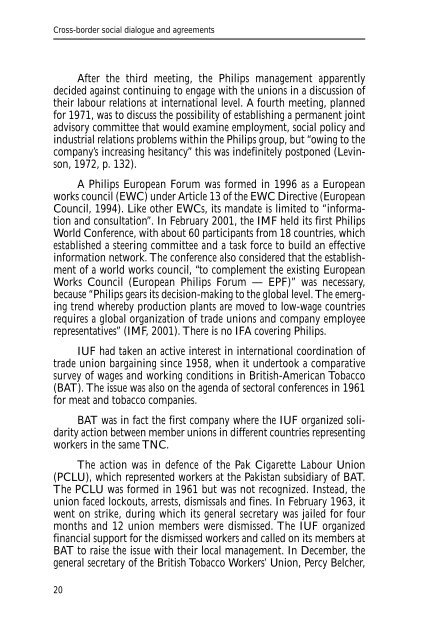CROSS-BORDER SOCIAL DIALOGUE AND AGREEMENTS: An ...
CROSS-BORDER SOCIAL DIALOGUE AND AGREEMENTS: An ...
CROSS-BORDER SOCIAL DIALOGUE AND AGREEMENTS: An ...
Create successful ePaper yourself
Turn your PDF publications into a flip-book with our unique Google optimized e-Paper software.
Cross-border social dialogue and agreements<br />
After the third meeting, the Philips management apparently<br />
decided against continuing to engage with the unions in a discussion of<br />
their labour relations at international level. A fourth meeting, planned<br />
for 1971, was to discuss the possibility of establishing a permanent joint<br />
advisory committee that would examine employment, social policy and<br />
industrial relations problems within the Philips group, but “owing to the<br />
company’s increasing hesitancy” this was indefinitely postponed (Levinson,<br />
1972, p. 132).<br />
A Philips European Forum was formed in 1996 as a European<br />
works council (EWC) under Article 13 of the EWC Directive (European<br />
Council, 1994). Like other EWCs, its mandate is limited to “information<br />
and consultation”. In February 2001, the IMF held its first Philips<br />
World Conference, with about 60 participants from 18 countries, which<br />
established a steering committee and a task force to build an effective<br />
information network. The conference also considered that the establishment<br />
of a world works council, “to complement the existing European<br />
Works Council (European Philips Forum — EPF)” was necessary,<br />
because “Philips gears its decision-making to the global level. The emerging<br />
trend whereby production plants are moved to low-wage countries<br />
requires a global organization of trade unions and company employee<br />
representatives” (IMF, 2001). There is no IFA covering Philips.<br />
IUF had taken an active interest in international coordination of<br />
trade union bargaining since 1958, when it undertook a comparative<br />
survey of wages and working conditions in British-American Tobacco<br />
(BAT). The issue was also on the agenda of sectoral conferences in 1961<br />
for meat and tobacco companies.<br />
BAT was in fact the first company where the IUF organized solidarity<br />
action between member unions in different countries representing<br />
workers in the same TNC.<br />
The action was in defence of the Pak Cigarette Labour Union<br />
(PCLU), which represented workers at the Pakistan subsidiary of BAT.<br />
The PCLU was formed in 1961 but was not recognized. Instead, the<br />
union faced lockouts, arrests, dismissals and fines. In February 1963, it<br />
went on strike, during which its general secretary was jailed for four<br />
months and 12 union members were dismissed. The IUF organized<br />
financial support for the dismissed workers and called on its members at<br />
BAT to raise the issue with their local management. In December, the<br />
general secretary of the British Tobacco Workers’ Union, Percy Belcher,<br />
20
















